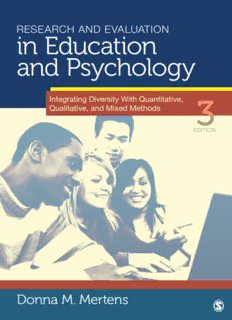
Research and Evaluation in Education and Psychology PDF
Preview Research and Evaluation in Education and Psychology
Copyright © 2010 by SAGE Publications, Inc. All rights reserved. No part of this book may be reproduced or utilized in any form or by any means, electronic or mechanical, including photocopying, recording, or by any information storage and retrieval system, without permission in writing from the publisher. For information: SAGE Publications, Inc. SAGE Publications India Pvt. Ltd. 2455 Teller Road B 1/I 1 Mohan Cooperative Thousand Oaks, California 91320 Industrial Area E-mail: [email protected] Mathura Road, New Delhi 110 044 India SAGE Publications Ltd. SAGE Publications Asia-Pacific 1 Oliver’s Yard Pte. Ltd. 55 City Road 33 Pekin Street #02-01 London, EC1Y 1SP Far East Square United Kingdom Singapore 048763 Printed in the United States of America Library of Congress Cataloging-in-Publication Data Mertens, Donna M. Research and evaluation in education and psychology : integrating diversity with quantitative, qualitative, and mixed methods / Donna M. Mertens. -- 3rd ed. p. cm. Includes bibliographical references and index. ISBN 978-1-4129-7190-4 (pbk.) 1. Education--Research--Methodology. 2. Psychology--Research--Methodology. I. Title. LB1028.M3964 2010 370.7′2—dc22 2009010779 This book is printed on acid-free paper. 09 10 11 12 13 10 9 8 7 6 5 4 3 2 1 Acquisitions Editor: Vicki Knight Associate Editor: Sean Connelly Editorial Assistant: Lauren Habib Production Editor: Astrid Virding Copy Editor: Taryn Bigelow Typesetter: C&M Digitals (P) Ltd. Proofreader: Dennis Webb Indexer: Molly Hall Cover Designer: Gail Buschman Marketing Manager: Christy Guilbault Brief Contents Preface xvii Chapter 1. An Introduction to Research 1 Chapter 2. Evaluation 47 Chapter 3. Literature Review and Focusing the Research 89 Chapter 4. Experimental and Quasi-Experimental Research 123 Chapter 5. Causal Comparative and Correlational Research 151 Chapter 6. Survey Methods 173 Chapter 7. Single-Case Research 207 Chapter 8. Qualitative Methods 225 Chapter 9. History and Narrative Study of Lives 267 Chapter 10. Mixed Methods Research 293 Chapter 11. Sampling 309 Chapter 12. Data Collection 351 Chapter 13. Data Analysis, Interpretation, and Use 403 Appendix 451 References 457 Author Index 491 Subject Index 503 Detailed Contents Preface xvii About the Author xxiii Chapter 1. An Introduction to Research 1 Why Bother? 1 What Is Research? 2 Research Terminology 3 Approach Taken in This Book 5 Major Paradigms in Research: A Brief History of Research 7 Postpositivism 10 Axiology 12 Ontology 14 Epistemology 15 Methodology 15 Constructivist Paradigm 16 Axiology 16 Ontology 18 Epistemology 19 Methodology 19 Transformative Paradigm 21 Why Did the Transformative Paradigm Emerge? 21 Philosophical and Theoretical Basis 25 Axiology 29 Ontology 32 Epistemology 32 Methodology 33 Validity From a Transformative Perspective: A Methodological Issue 34 Pragmatic Paradigm 35 Axiology 36 Ontology 36 Epistemology 38 Methodology 38 Politics, Legislation, and the Paradigms 39 Why Is the Methodology of Research a Political Issue? 39 Professional Organizations’ Response to NCLB 40 Contested Territory: Quality, Causality, and Objectivity 42 Merging Paradigms 43 Summary of Chapter 1: An Introduction to Research 44 Chapter 2. Evaluation 47 Defining Evaluation 47 Distinguishing Research and Evaluation 53 History and Models of Evaluation 54 Postpositivist Paradigm 56 Constructivist Paradigm 59 Transformative Paradigm 59 Pragmatic Evaluation Approaches 65 Resources and Processes for Conducting Evaluations 66 Evaluation Resources 66 Books and Monographs 66 Online Resources 67 Evaluation Journals 68 Professional Associations 68 Steps in Planning an Evaluation 68 Focusing Stage 69 Evaluation Questions 75 Selection of an Evaluation Model 77 Planning the Evaluation 77 Management of the Evaluation 78 Standards for Critically Evaluating Evaluations 79 Ethics and Evaluation: The Guiding Principles 83 Questions for Critically Analyzing Evaluation Studies 84 Feasibility 84 Propriety 84 Accuracy 85 Utility 85 Metaevaluation 86 Interpersonal Validity 86 Consequential Validity 86 Multicultural Validity 86 Summary of Chapter 2: Evaluation 87 Chapter 3. Literature Review and Focusing the Research 89 Reasons for Doing Literature Reviews 90 Literature Reviews for Planning Primary Research 90 Review of Literature as an End in Itself 91 The Search Process 93 Step 1: Identify Research Topic 94 Sources of Research Topics 94 Step 2: Review Secondary Sources to Get an Overview 96 Step 3: Develop a Search Strategy 97 Identify Preliminary Sources 97 Identify Primary Research Journals 101 Personal Networking 102 Involvement of Community Members 104
Description: